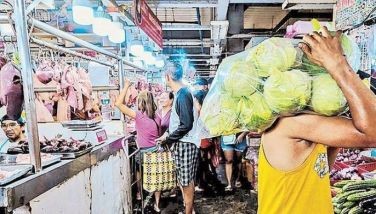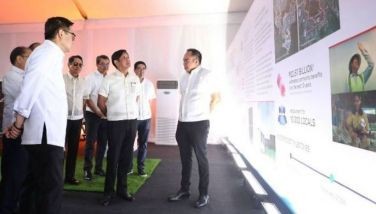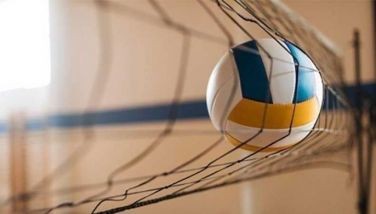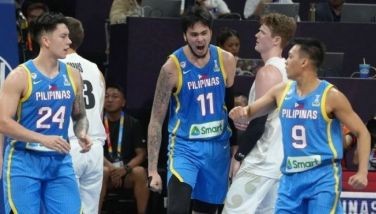Overwhelming support by American people

San Francisco – I am quite accustomed to the ways of Americans having studied and worked here for 17 years. I have also been a frequent visitor. I have always admired their generosity but I never experienced the overwhelming support, both financial and moral extended by Americans in all walks of life in the wake of the destruction wrought by Typhoon (Haiyan) Yolanda. When we went to Mass, the homily always had a prayer and appeal for the Philippines. I was sitting in a car waiting for my wife when a man asked if I came from the Philippines. When I answered affirmatively, he introduced himself as NBC San Francisco. He said that they were featuring the aftermath of the super typhoon and wanted to ask Filipinos in the area how they planned to help. That gave me an excellent opportunity to appeal for donations recommending that it be given to the US Philippines Society, an IRS exempted organization. Checking into our flight, the attendant asked if my relatives were safe from harm’s way and asked how he can help. My grandchild in San Jose informed me that their class was collecting old clothes. My Georgetown classmates immediately responded. We were shopping in Costco and at the checkout counter, there was a sign asking for donations. The iconic Empire State Building lit up their building in the colors of our flag, initiated by a major shareholder Peter Malkin, a Harvard Law classmate of my brother Dick. Every newspaper and TV station covered the Philippines. Commentators remarked on the resiliency of the Filipino people despite the situation even as they expressed their dismay at how the government and leadership managed the crisis.
The original purpose of my trip was to participate in a Forum on Philippine Public Health: Progress and Challenges. It was sponsored by the Washington, DC based US-Philippines Society, Center for Strategic and International Studies (CSIS), Johns Hopkins Bloomberg School of Public Health and the Embassy of the Philippines. Health Secretary Enrique Ona was to be the keynote speaker, followed by former Secretary Dr. Esperanza Cabral who was to present the challenges of reproductive health. In turn, Zuellig Family Foundation president Ernesto Garilao was to present the Health Change Model which was successfully implemented in the rural areas prompting the Department of Health to establish a public-private partnership designed to implement the model in 609 municipalities. This took place on Nov. 12, four days after Typhoon Yolanda had already devastated Tacloban, the whole of Leyte province and Samar, and parts of Cebu and Panay Islands and Palawan.
The opening speaker, Ambassador John Negroponte, the co-chair of the Society focused on Yolanda and the need for assistance for the victims. From that point on, the major speakers including Secretary Ona (via video conference from the PLDT office in Makati) discussed and described the details of the damage done. There were about 100 in the conference room of the newly built CSIS building. During the coffee break, all expressed desire to help the victims. Subsequently, it was announced that donations would be accepted by the US-Philippines Society on their website.
After the Forum, Dr. Cabral and Ernie Garilao drove to Baltimore, Maryland where they met with Johns Hopkins Bloomberg School of Public Health officials. The purpose was to explore modalities on how to support the Philippines in the future. They also expressed a desire to send their “Johns Hopkins Go team†to Tacloban as soon as possible. To date, they have not been granted permission despite the urgent appeal of Ambassador Jose Cuisia. We are embarrassed by the glacial speed with which this request is being handled. I gather that this has been all too common an experience by donors.
After Washington, DC, we were scheduled to meet with the Filipino American Community at the Philippine Center in New York hosted by Consul General Mario de Leon, Jr. Zaldy Patron, the deputy Consul General informed me that unlike other events, the record turnout (especially during a weekday) was surprising. The audience came from all over the tri-state area, even from Albany, NY, to learn more about Yolanda. In the ladies room, my wife informed me that the conversation led to the fact that they were ready to donate to the US-Philippines Society or the Zuellig Family Foundation. They expressed suspicion about other NGOs having been tainted by PDAF.
I just spoke to Ambassador John Maisto, president of the society who confirmed that contributions continue to come in their website in the magnitude of 299 individual donors so far. He also mentioned that Mr. Hank Greenberg, CEO of CV Starr contributed $500,000. Another group called “Direct Relief†contributed $100,000 with the proviso that their funds should be used immediately for distribution of goods to the victims. Malu Araque of his staff described how grade school kids were contributing pennies from their piggy bank. Maisto did not want to give an exact tally at the time because more was expected throughout the week.
I am now in San Francisco and to my surprise I am still getting calls asking how they can support the relief efforts. Consul General Marciano Paynor informed me that San Francisco Mayor Edwin Lee joined the memorial Mass for the victims and gave a donation from his group. The generosity of the American people deserve our recognition and gratitude. I would also like to cite the commitment and dedication of Ambassador Jose Cuisia, his staff and the Consulates in the US in securing assistance for the typhoon victims.
US government aid
I would be remiss if I did not cite the support of the US government as manifested by the presence of US Navy ships and Marines. It is proof positive that they consider us friends and allies. This manifestation of support from the US government is “real politik†in practice, which presumably has been duly noted by our Chinese friends in the mainland.
When State Secretary John Kerry postponed his trip to Manila citing Tropical Storm Santi (Nari) as the reason, one writer lightheartedly asked if America is just a fair weather friend. The immense effort that they are expending in helping us provide relief to the victims of typhoon Yolanda has certainly proven that America is a foul-weather friend of the highest order. In the face of such generosity and concern, it might seem ungrateful to bring this up. But I feel that question – rife with irony now – is worth raising at this point. I am referring to the political and security storm that China is stirring in the West Philippine Sea. Despite the trumpeting of an American pivot to the Pacific, it has not been backed up by decisive action including major redeployment of resources. The Middle East remains America’s foreign policy priority. They commit billions every year to Afghanistan, Pakistan, Israel and until recently Egypt. One can only wish, that the US would be just as committed – even at a fraction of those billions – in helping the Philippines not just during calamities but in the everyday challenge of facing up to security threats with not only national but broad regional and global implications. For one, despite the fact that the Philippines is the only other country in Asia – Japan being the other – with a Mutual Defense Treaty with the US, there is still unease as to how committed they are given America’s ambivalence in its relations with China – part enemy, part collaborator. But there should be no ambivalence in guaranteeing freedom of passage in one of the most important waterways in the world – something that cannot be guaranteed under conditions of a single hegemony.
- Latest
- Trending




























